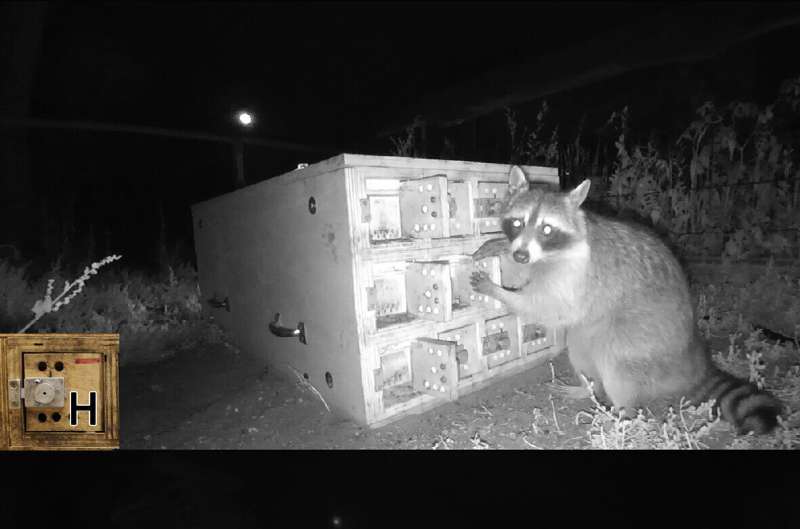July 24, 2024 report
This article has been reviewed according to Science X's editorial process and policies. Editors have highlighted the following attributes while ensuring the content's credibility:
fact-checked
peer-reviewed publication
trusted source
proofread
Wild raccoons are flexible learners, puzzle box study shows

A team of zoologists and cognitive ecologists at the University of Wyoming has found that wild raccoons are flexible learners. In their research project, published in the journal Proceedings of the Royal Society B: Biological Sciences, the group captured video of raccoons attempting to access food inside puzzle boxes.
Prior research has shown that raccoons are not only curious, but highly intelligent. They are one of the few species of animals that have adapted well to human encroachment. For this new study, the research team wondered if part of their success is based on flexible learning, in which members of a group learn in different ways.
To find out, they placed large puzzle boxes in suburban areas where wild raccoons were known to congregate. All of the boxes had multiple compartments, each with its own small door. Holes in the doors allowed the raccoons to see and smell the contents. The researchers baited the compartments with a mix of dog kibble and sardines, treats that appeal to raccoons. To make it interesting, each of the doors was locked in a different way.
The researchers found that the raccoons took individualistic approaches to getting at the treats. Some used different techniques to open the doors, others used different positions. And in a surprise, small groups would often simply wait behind another raccoon as it fiddled with the lock—upon success, they would push him out of the way and grab the food treat.
The researchers found that the raccoons were successful at getting a treat approximately 25% of the time—if they were unsuccessful, they would simply give up and go search for food elsewhere.
The research team found multiple examples of flexible learning, in which the animals would learn by themselves or by watching others in action. They suggest such flexibility likely helps explain their success in adapting to human-occupied areas.
More information: Lauren A. Stanton et al, Wild raccoons demonstrate flexibility and individuality in innovative problem-solving, Proceedings of the Royal Society B: Biological Sciences (2024). DOI: 10.1098/rspb.2024.0911
Journal information: Proceedings of the Royal Society B
© 2024 Science X Network




















